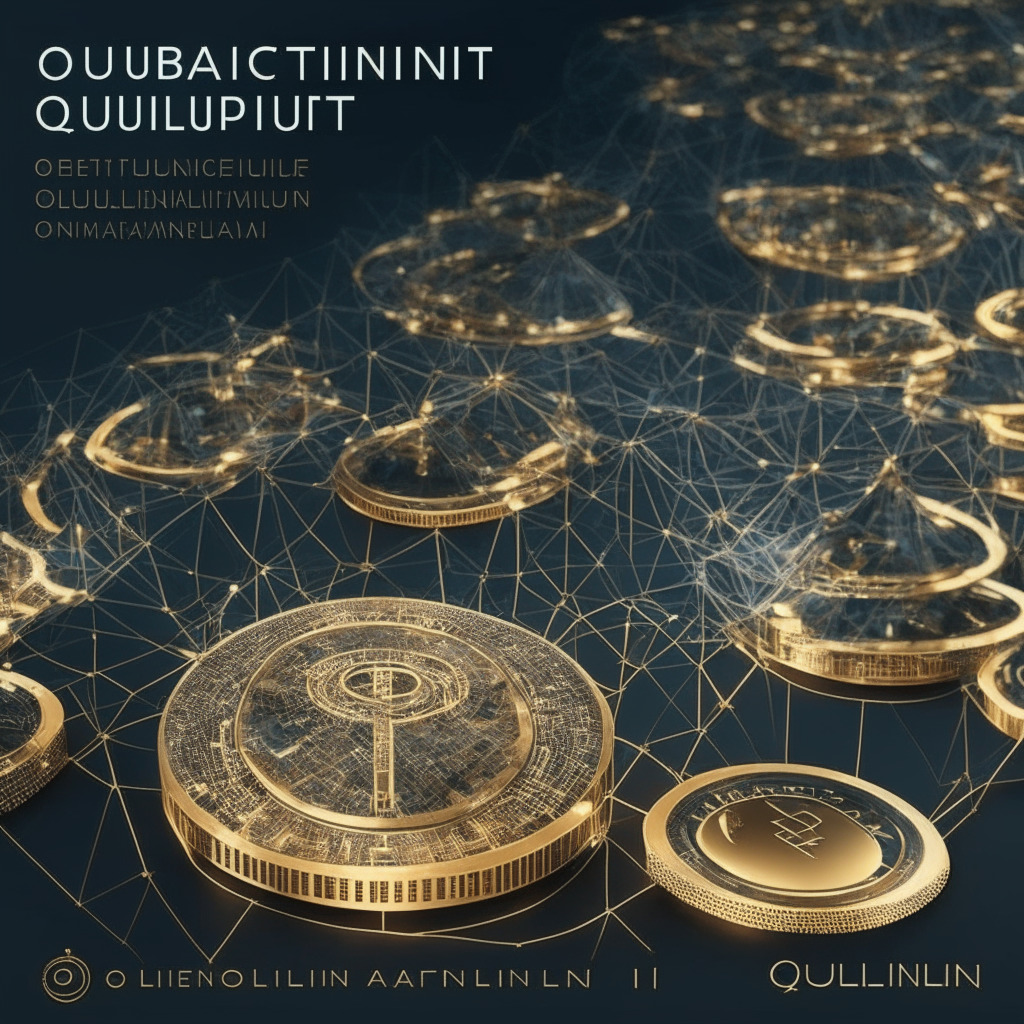Ledger introduced the “Ledger Recover” feature, aimed at future crypto users, storing encrypted seed phrases with third-party custodians. Critics argue it undermines privacy and security. The challenge lies in balancing user experience with dedication to core principles while attracting new users to blockchain and cryptocurrencies.
Search Results for: SEPA
Bankrupt Crypto Lender Celsius Stakes $75M ETH via Figment: Motives and Implications
Celsius Network staked nearly $75 million worth of ETH through Figment, raising questions on its motives amid ongoing bankruptcy proceedings. The crypto lender’s choice to use Figment instead of its own pool adds to the intrigue, highlighting the delicate balance between risk and reward in the cryptocurrency and blockchain sphere.
Ethereum’s Bedrock Hard Fork: Optimism’s Game Changer or Arbitrum’s Continued Dominance?
The Ethereum blockchain will undergo the Bedrock hard fork on June 6 as Optimism, a layer 2 scaling solution, introduces a major upgrade for improved modularity, simplicity, and Ethereum equivalence. This is expected to increase performance and functionality, while fueling positive market sentiment for Optimism’s Layer 2 network.
Exploring the 26,500% Surge in SHIB Token Burn Rate: Impact on Investors and Market Dynamics
Over 3 billion SHIB tokens have been sent to dead wallets in the last 24 hours, increasing the burn rate by 26,500%, balancing a recent drop in burn activity. The SHIB token burn feature helps reduce circulating supply and attract investors seeking deflationary cryptocurrencies.
SEC’s Inconsistency on Crypto: LBRY Penalty Reduction Sparks Debate
The SEC’s ambiguous stance on cryptocurrencies, as seen in its lowered penalty on LBRY’s LBC token and its denial of Coinbase’s request for clarification, highlights the need for clear regulations and guidelines for crypto market growth, innovation, and adoption.
Ledger’s Controversial Nano X Update: Recover Feature Security Debate
Ledger recently introduced the Ledger Recover feature for its Nano X device, allowing users to encrypt and distribute seed phrases among different custodians. While Ledger claims enhanced security, concerns have been raised regarding ID verification and potential exposure to identity theft. Users must weigh potential benefits against associated risks in this multi-custodian recovery process.
Anchorage Digital Enhances Crypto Governance with Snapshot Voting: Pros, Cons & Conflicts
Anchorage Digital integrates Snapshot voting for custody customers, aiming to improve participation in crypto governance. Supporting over 60 ERC-20 tokens, the off-chain platform eliminates interoperability issues and streamlines protocol interactions. Snapshot’s gasless voting feature enhances accessibility, reflecting the growing importance of efficient crypto governance mechanisms.
Binance CEO Unfollows Elon Musk: Impact on $500M Twitter Investment and Crypto Industry
Binance CEO Changpeng Zhao unfollows Elon Musk on Twitter, sparking curiosity. Despite this, Binance plans to proceed with its $500 million investment in Twitter, supporting free speech, crypto industry, and Musk’s vision for web3 integration.
Crypto Funds’ Outflows vs Altcoins Inflows: Uncertainty Grips Market Amidst Diverging Sentiments
Investors withdrew over $54 million from large digital asset funds amidst Bitcoin’s price drop. However, there seems to be a shift towards alternative crypto assets, pointing to a mix of bullish and bearish attitudes in the digital asset market.
French Bank Raid Exposes Flaws: How Blockchain Can Alleviate Fraud and Tax Evasion
The French fraud and money laundering case involving major banks highlights the challenges of determining shareholders responsible for paying taxes on dividends. Blockchain technology could offer a solution, providing a transparent, verifiable, and immutable single source of truth for capital markets, streamlining operations, reducing fraud, and enhancing trust and regulation.
Blurring the Lines: Checks Elements Combines NFTs and Hand-Drawn Art – A Harmonious Future?
Jack Butcher launches Checks Elements, combining generative art with hand-drawn physical prints in a 152-piece collection inspired by earth, fire, water, and air. Bridging digital and physical art, the collection connects Ethereum-based NFTs with Butcher’s authenticated monoprints.
Lawsuit Accuses Jump Trading of Manipulating TerraUSD: Market Deception & Regulatory Pressure
A lawsuit against Chicago-based Jump Trading accuses the firm of conspiring with Terraform Lab’s then-CEO to manipulate TerraUSD (UST) stablecoin’s value, misleading investors about its price and risks. The suit highlights the need for clearer regulations, increased oversight, and investor awareness about potential risks in the crypto sector.
Building Emergency Funds with Budgeting Apps: Pros, Cons, and Top Picks
This excerpt discusses the importance of financial planning and the role of budgeting apps in building an emergency fund. It highlights setting realistic savings goals, automating savings, and leveraging built-in features of apps like Mint, YNAB, and Personal Capital to effectively manage finances and create a financial safety net.
Bipartisan Rift Emerges on Stablecoin Bill: Consumer Protection vs State Regulation
House Democrats are considering a separate stablecoin bill, highlighting a rift with the parallel Republican effort. Addressing stablecoins is a key priority for US lawmakers overseeing crypto operations. The Democratic bill focuses on consumer protection, granting the Federal Reserve veto power over issuer registration, while the Republican version empowers states to regulate issuers.
Coinbase Forms Advisory Council with Ex-Lawmakers: Navigating Crypto’s Regulatory Future
Coinbase forms Global Advisory Council, featuring former US lawmakers and industry leaders, aiming to better understand global cryptocurrency policies and navigate market intricacies. This proactive approach showcases Coinbase’s dedication to engaging with policymakers and experts, benefiting the entire crypto community and promoting growth within the blockchain sector.
SEC Crackdown on Crypto Fraud: Protecting Investors or Stifling Innovation?
The SEC has targeted fraudulent websites offering high returns on crypto-related investments, aiming to eliminate bad actors in the industry. However, critics argue that the broad enforcement approach hurts legitimate businesses and could stifle innovation and growth in the crypto sector.
MakerDAO’s Endgame Plan: Roadmap to Improved Governance and DAI’s Dominance in Stablecoin Market
MakerDAO’s Endgame plan, devised by founder Rune Christensen, aims to improve governance, secure DAI’s status as a popular stablecoin, and maintain decentralization. The five-phase roadmap includes a Beta launch, creation of SubDAOs, development of governance AI tools, Sagittarius Lockstake Engine launch, and a rebranded new chain, fostering a sustainable, balanced, and decentralized platform.
Franklin Templeton’s 2nd Blockchain Fund: Attracting Wealthy Investors & Future Prospects
Franklin Templeton plans to establish Blockchain Fund II, a private equity fund requiring a minimum investment of $100,000, targeting institutional investors and affluent individuals. This move signifies the growing recognition of cryptocurrencies and the financial sector’s eagerness to capitalize on the crypto market.
Bitcoin Price Drop: Regulatory Uncertainty and Resilient Traders Battle for $28,000
The Bitcoin price dropped 7% on May 12, breaking below the 55-day support and liquidating $100 million worth of long BTC futures contracts. Possible causes for the decline include increased regulatory uncertainty in the U.S., concerns over Grayscale GBTC Trust Fund holdings, and the Dollar Strength Index. Despite this drop, derivative market metrics and trader stances indicate hope for a recovery towards $28,000.
Exploring Web3 Wallets: Bridging the Gap Between Security and Convenience
The Web3 ecosystem relies on wallets for user identity verification and transaction authorization. Wallet infrastructures like Magic, Dfns, and Web3Auth aim to provide both security and convenience by exploring seedless wallets, multiparty computation (MPC), and Hardware Security Modules (HSM).
BlockFi Bankruptcy Case: Unraveling Crypto Regulations and Future Challenges
BlockFi’s recent bankruptcy case highlights the complexities of crypto regulations and the need for clearer alignment between digital assets and regulatory frameworks. As cryptocurrencies gain mainstream adoption, regulatory authorities must adapt swiftly to ensure fairer and more comprehensive regulations, protecting investors and fostering a stable crypto market.
The Need for Regulating Crypto Custodians: Safeguarding Digital Assets and Building Trust
A robust regulatory framework specifically designed for custodians is crucial in the evolving cryptocurrency industry. Custodians mitigate risks by safeguarding digital assets, separating them from exchanges. Governments must establish transparent rules enabling custodians to operate legally, ensuring investor protection and a secure ecosystem.
Franklin Templeton’s 2nd Blockchain Fund: Mainstream Adoption or Overhyped Bandwagon?
Franklin Templeton, a global asset management giant with $1.4 trillion in assets, is expanding its portfolio with a second blockchain fund, Blockchain Fund II. The fund aims to attract investors seeking exposure to disruptive technology within the growing blockchain and digital assets market, showcasing the increasing interest of traditional finance institutions in the potential of this sector for innovation and mainstream adoption.
Tether’s Bitcoin and Precious Metals Investments: Transparency Boost or Market Risk?
Tether’s recent attestation report reveals approximately $1.5 billion worth of Bitcoin, accounting for nearly 2% of its total reserves. The inclusion of Bitcoin and precious metals, totaling $3.4 billion, aims to enhance transparency for USDT stablecoin holders. However, concerns arise about potential risks due to market fluctuations.
US Government Offloading Bitcoin: Fact or Misinformation? Pros, Cons, and the Need for Vigilance
The recent speculation about the US government offloading thousands of Bitcoin has raised questions about governmental involvement in the cryptocurrency market. This highlights the need for vigilance and skepticism among crypto enthusiasts, as sudden market shifts can result from major players holding vast amounts of cryptocurrency.
Urgent Joint House Meeting on Crypto Regulations: Debating the Need for New Legislation
A joint meeting between two US House of Representatives committees discussed cryptocurrency regulations, with some members pushing for new legislation while others expressed skepticism. The ongoing debate highlights the complexity of developing a clear and effective regulatory framework as digital assets become more integrated in financial sectors.
Transitioning from Web2 to Web3: Successes and Shortcomings in NFT Launches
Web2 companies entering the Web3 ecosystem face challenges, as success in traditional industries doesn’t guarantee smooth transition. Porsche’s NFT project struggled due to lack of transparency, confusing minting process, and poor marketing, while Reddit succeeded by integrating Web2 elements and providing accessible NFTs. Collaboration with Web3 native experts is key for successful ventures.
Vega Alpha Mainnet: Revolutionizing Decentralized Derivatives Trading or Facing Uphill Battle?
The Alpha mainnet launch of Vega, a crypto derivatives protocol, offers decentralized trading of financial products, including options and futures. Its community-driven approach, no gas fees, and measures against front-running make it stand out. However, competing in the dynamic DeFi landscape and long-term sustainability remain challenges.
Bitcoin Ordinals: Unleashing NFT Potential & Shaping Crypto Adoption
In a recent podcast, Michael Saylor discussed the impact of Ordinals on Bitcoin mining and adoption. Ordinals are digital assets written on a Satoshi, enabling the creation of NFTs on the Bitcoin blockchain. Top crypto firms like OKX and Binance are now supporting Bitcoin Ordinals, highlighting their potential to enhance Bitcoin’s capabilities and bring in new users.
GALA Contract Swap: Binance vs. Coinbase – Differing Approaches & Implications
The Gala Games ecosystem plans to issue new V2 tokens, with Binance supporting the GALA contract swap and handling technical requirements. In contrast, Coinbase abstains, raising questions about its stance on supporting new blockchain developments. Both platforms’ decisions bear potential merits and risks for users in the evolving crypto landscape.
OKX Transfers $60M to Defunct Hedge Fund Alameda: Repaying FTX Creditors or More to Uncover?
OKX crypto exchange reportedly transferred $60 million worth of digital assets to defunct hedge fund Alameda Research’s wallets, raising questions in the crypto community. This transfer may be part of a restitution effort to repay creditors of FTX, Alameda’s sister company.
SEC’s Crypto Custody Rule Change: Balancing Innovation vs. Investor Protection
The SEC has proposed tighter crypto custody rules which are met with strong opposition from the Blockchain Association and Andreessen Horowitz. They argue the rules would curtail investment, exceed the SEC’s authority, inhibit advisors, and risk assets. Balancing innovation, growth, investor protection, and compliance remains a core conflict.































